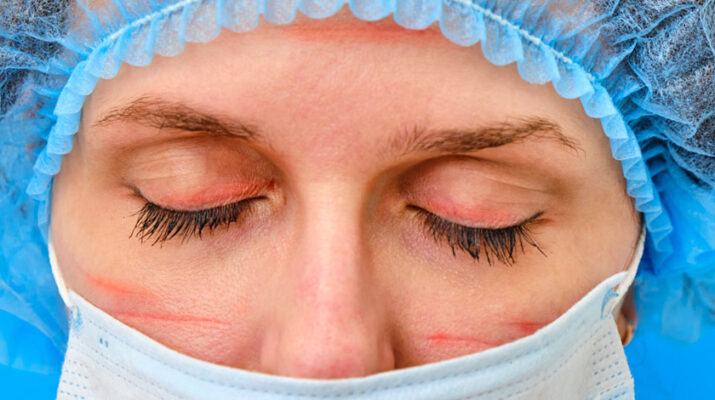How to keep blemish-free during COVID-19
By Deborah Jeanne Sergeant
Masks are not the only things on people’s faces during the pandemic. Crops of acne colloquially called “maskne” and other blemishes have also made an appearance, thanks to the face mask’s presence. Many people have to wear a mask all day, which only exacerbates the problem.
Lisa Ball, Ph.D., board-certified family nurse practitioner and owner of Neiman Dermatology in Williamsville, recommends wearing only a clean mask.
“One a day may not be enough,” she said.
She prefers cotton as it is breathable, gentle on the skin and washable for subsequent use. Wearing the same mask all day – for those who can seldom remove theirs – or wearing the same one every day without washing it causes build-up of oil and dirt on the mask. At least changing the mask midday for a clean one can help keep the face cleaner.
The chemicals used for processing paper masks can contribute to the irritation. Ball recommends using fragrance- and color-free detergent for cleaning cloth masks.
One of the reasons that masks cause breakouts is that they trap moisture against the skin because of respiration. Before donning a mask, Ball recommends applying a zinc-based barrier such as one used for diaper dermatitis, or a barrier like Vaseline, Aquaphor or, at the corners of the mouth, Triple Paste AF, an anti-fungal treatment. All of these are over-the-counter products.
“The most important thing is gentle cleansers,” Ball said. “Don’t go scrubbing your face. Be careful with retinoids. Don’t exfoliate so much. Use non-comedogenic moisturizer under the mask. Wash your face in the morning and in the evening with a gentle, hydrating cleaner.”
She likes SkinCeuticals, Cetaphil and CeraVe products.
Women are not the only ones with skin issues caused by masks. In addition to acne, men wearing masks tend to experience folliculitis which can manifest as a pimple-like blemish, but it is caused by friction against a shaved hair. The overlying, thickened skin will not allow the hair to break through and can trap bacteria. This causes the blemish.
Shaving the beard with an electric razor or allowing a short beard to grow can alleviate this issue as it lessens the irritation to the skin.
“We’ve had to write notes asking if men can be allowed to grow their beard,” Ball said. “There are products we can provide but it’s a very difficult treatment.”
Friction also causes problems for women, especially if they are wearing foundation and other makeup under the mask. Pat Riley, owner of Avon Beauty Centers by Pat Riley in East Amherst and Depew, said that using a quality moisturizer provides a protective barrier to the skin.
“Many people don’t use a moisturizer because they don’t think they have to with a mask on,” she said. “They don’t keep up with daily cleansing. They think their skin isn’t getting dirty because it’s under the mask.”
She advises women who wear a mask all day to skip makeup and stick with just a moisturizer to avoid irritating the skin.
A nighttime moisturizer can help restore the skin’s balance, as its photosensitive formula works best in the dark.
Photo: Some medical professionals are experiencing skin abrasions and breakouts from long-term mask wearing.

